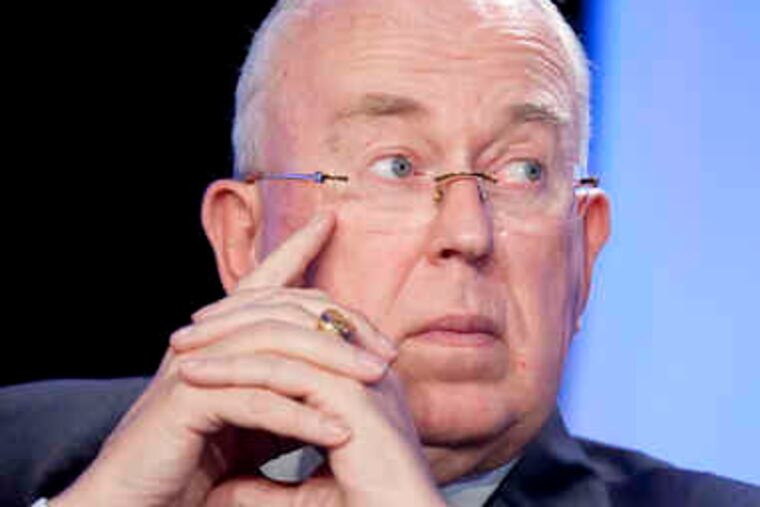Exelon chief backs cap-and-trade system
Exelon Corp. chief executive officer John W. Rowe yesterday rallied support for federal climate legislation amid signs that a compromise may be possible on a bill to limit greenhouse-gas emissions.

Exelon Corp. chief executive officer John W. Rowe yesterday rallied support for federal climate legislation amid signs that a compromise may be possible on a bill to limit greenhouse-gas emissions.
Rowe, whose company owns Peco Energy Co., the Philadelphia electric and gas utility, said in an interview that a market-based cap-and-trade bill was the best way to reduce emissions most cost-effectively.
Rowe said he preferred the cap-and-trade mechanism rather than legislation that sets strict quotas for politically attractive renewable-energy sources such as wind and solar, which reduce emissions of greenhouse gases but at a higher cost than by conservation, natural gas generation, or upgrading existing nuclear facilities.
A cap-and-trade scheme would require companies to get an annual permit for every ton of carbon dioxide they emit into the atmosphere. Businesses that do not use all of their permits could sell them to companies that need more. Theoretically, the system would encourage businesses to reduce carbon emissions in the cheapest manner.
"Let's be candid. We all have our favorite technologies - wind, solar, nuclear, carbon sequestration," Rowe said in telephone interview from Exelon's Chicago headquarters ahead of a scheduled appearance last night at a global-warming conference in Penn Valley sponsored by Citizens for Pennsylvania's Future, or PennFuture.
"At the present time, solar is very expensive," he said. "Carbon sequestration is very expensive. Nuclear and wind are quite expensive. And gas and energy efficiency are a lot cheaper."
Rowe, whose company stands to benefit from a climate bill because of its big investment in emission-free nuclear reactors, said he was optimistic that Congress would take up the legislation this year or early next year. "What's important is that Congress act on it," he said.
He said he was encouraged by a weekend New York Times opinion article by Sen. Lindsey Graham, the South Carolina Republican, and Sen. John Kerry, the Massachusetts Democrat, suggesting there is room for bipartisan compromise on climate legislation.
Rowe and Exelon were in the news recently when the company withdrew from the U.S. Chamber of Commerce in protest of the trade group's strident opposition against climate-control legislation.
"We did it because on this issue, which we think is fundamental to the ecology, the economy, and to Exelon, we were at odds with the expressed position of the chamber," he said. "But there's no malice in it."
Rowe said he planned to visit Washington today to lobby for the climate bill.
Rowe said he supported a cap-and-trade system that set initial limits on the market prices for carbon permits to reduce the chance of causing dramatic price increases to energy supplies.
But Rowe said it would be dishonest to suggest energy prices would not increase to pay for emission reductions.
"The whole thought that there's some way of doing this that's free and easy for everyone and doesn't involve any hard decisions, just isn't so," he said.
Rowe said it was important to move deliberately because the economy is still fragile and a recovery is expected to take three to five years.
"We think it will take several years to get back to the demand levels we had in 2008. . . . We don't see anything that happens that makes a quick recovery in the employment rate," he said.
"We don't think the economy can afford a big hit for carbon right now," he said. "We think you should start soon, you should start slow, and you should make a very predictable public policy of dealing with it, but you shouldn't take a big risk on shocking the economy."